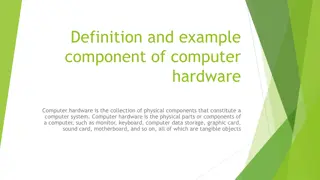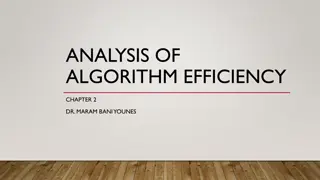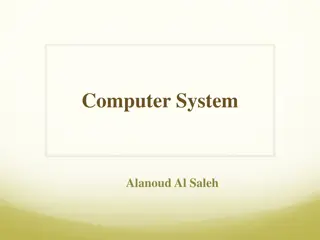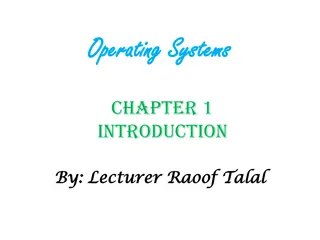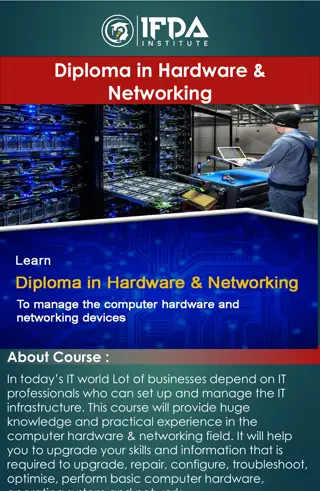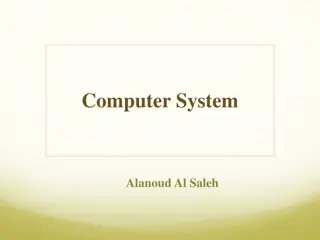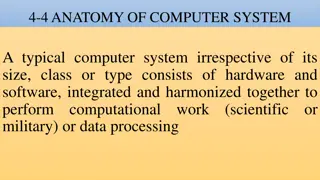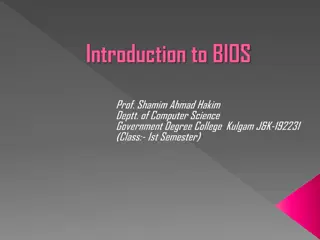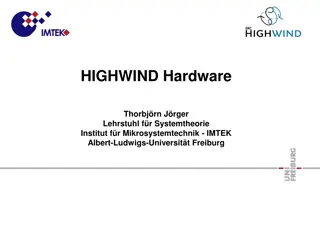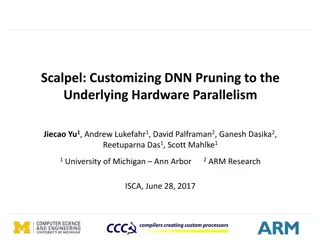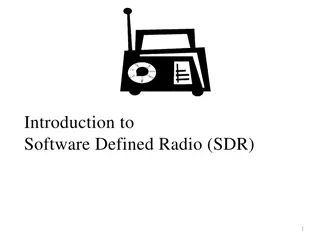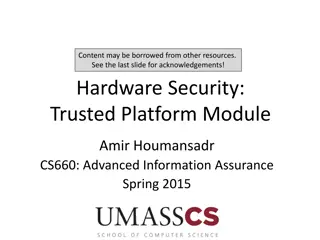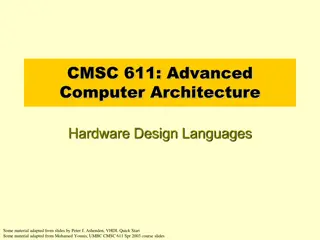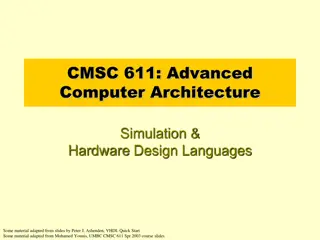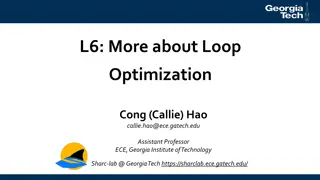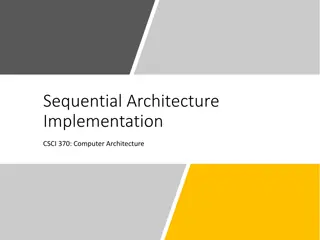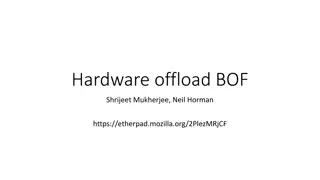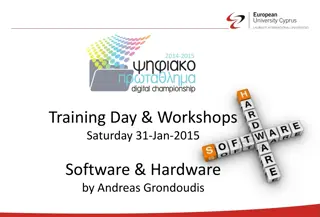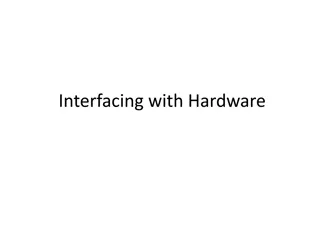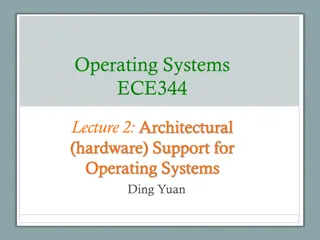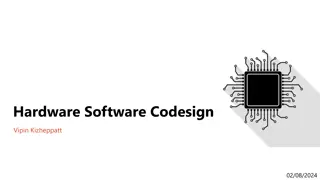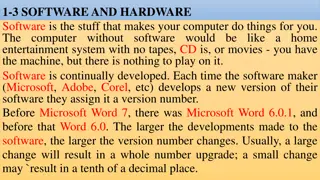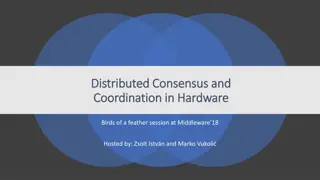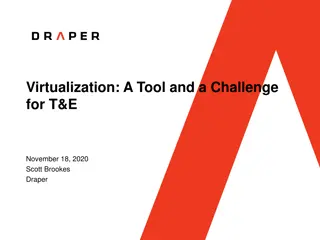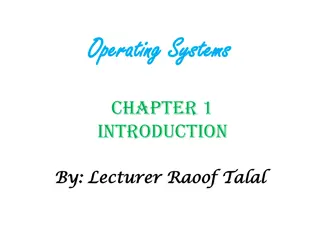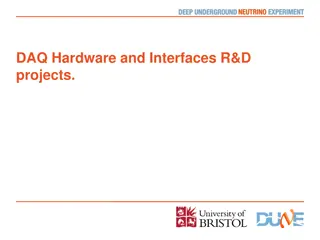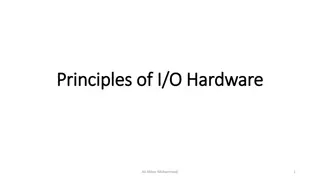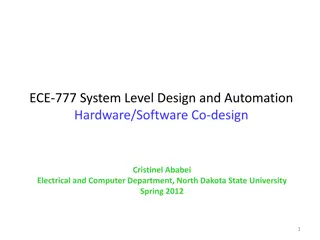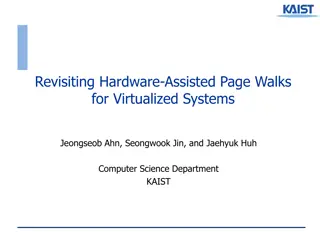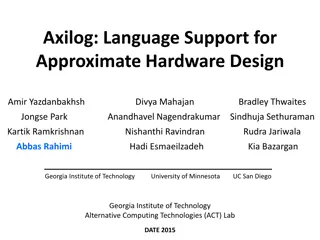Understanding Computer Organization and Architecture
A computer system is a programmable digital electronics device that processes data as per program instructions to provide meaningful output. It comprises hardware and software components, with hardware being the physical parts and software essential for driving the hardware. Computer organization fo
14 views • 71 slides
Addressing Monitoring Challenges in Hardware Offloading
Exploring the complexities of offloading monitoring tasks in hardware, this content delves into the limitations of current methods such as move_pages and IBS/PEBs-based monitoring. It highlights the need for efficient tracking mechanisms like IDLE-bit and proposes innovative solutions like Transpare
3 views • 17 slides
Hold Down and Release Mechanism Hardware Simulator for Ground Deployment Testing
The project involves developing a hardware simulator for testing a Hold Down and Release Mechanism used in Mars Sample Return missions. The simulator aims to replicate the functionality of expensive flight hardware at a lower cost and with reduced lead time. Key requirements include precise activati
3 views • 8 slides
Stainless Steel D Rings, O Rings & Weldable D Ring Hardware
Explore our collection of high-quality stainless steel D rings, weldable D rings, and versatile O rings. Ideal for various hardware applications, our rings ensure durability and reliability. Shop now at Buckles International for premium hardware rings.
0 views • 9 slides
Overview of Computer Hardware Components and Software Functions
Computer hardware components such as monitor, CPU, mouse, and projector are essential physical parts of a computer system, while software includes intangible programs like operating systems and utility software. Hardware components perform tasks like displaying data, processing information, and prin
8 views • 9 slides
Understanding Algorithm Efficiency Analysis
In this chapter, Dr. Maram Bani Younes delves into the analysis of algorithm efficiency, focusing on aspects such as order of growth, best case scenarios, and empirical analysis of time efficiency. The dimensions of generality, simplicity, time efficiency, and space efficiency are explored, with a d
1 views • 28 slides
Understanding Computer Systems: Components and Organization
Computer systems are high-speed electronic machines that process data and instructions through hardware and software components. The elements include hardware, software, and users, with binary systems using bits and bytes to represent data. The organization of a computer involves input, CPU, memory,
2 views • 21 slides
Understanding Operating Systems: Introduction and Functions
An operating system plays a crucial role in managing computer hardware and facilitating user-computer interactions. It serves as an intermediary between users and hardware components, ensuring efficient resource allocation and control. The operating system coordinates the use of hardware resources b
5 views • 16 slides
Diploma in Hardware & Networking: Upgrade Your IT Skills
This course provides comprehensive knowledge and practical experience in computer hardware and networking, essential for managing IT infrastructure. Gain expertise in PC hardware maintenance, customer and networking support, and more to pursue a career as a Hardware and Network Engineer. Learn to as
1 views • 8 slides
Understanding Computer Systems and Components
Computer systems are high-speed electronic machines that process data and instructions to solve problems. They consist of hardware and software elements, with input and output devices for interaction. Key concepts include binary system, byte measurement units, hardware organization, and input hardwa
1 views • 21 slides
Efficient Data Race Detection Using Transactional Memory
This presentation discusses data race detection in multithreaded programs, exploring the impact of race conditions and the state-of-the-art dynamic data race detector solutions. It introduces a hybrid software and hardware approach leveraging Hardware Transactional Memory for lightweight data race d
1 views • 31 slides
Anatomy of a Computer System: Hardware Components and Functions
A typical computer system consists of hardware and software working together to perform various computational tasks. The hardware components include the central processing unit (CPU), input/output devices, storage units, and the motherboard. The CPU acts as the main brain of the computer, performing
6 views • 6 slides
Understanding Computer Hardware Components
Computer hardware encompasses the physical components of a computer system that can be touched and felt, such as the motherboard, CPU, RAM, and storage devices like HDD and SSD. Without hardware, essential software cannot run efficiently. This lesson explores the definition, importance, and various
1 views • 6 slides
Understanding the Basics of BIOS in Computers
BIOS (Basic Input Output System) is a crucial piece of software that serves as an intermediary between a computer's hardware and the operating system. It plays a fundamental role in facilitating communication and interaction between the hardware components and software applications. This article del
1 views • 26 slides
HIGHWIND Hardware: Team and Responsibilities Overview
Explore the team and responsibilities behind the HIGHWIND hardware project, involving airplane components, sensors, actuators, communication interfaces, control software, and visualization. Meet the dedicated members working on flight software and hardware, all focused on enhancing communication, sa
1 views • 31 slides
Optimizing DNN Pruning for Hardware Efficiency
Customizing deep neural network (DNN) pruning to maximize hardware parallelism can significantly reduce storage and computation costs. Techniques such as weight pruning, node pruning, and utilizing specific hardware types like GPUs are explored to enhance performance. However, drawbacks like increas
0 views • 27 slides
Overview of Electronics Maintenance and Pre-Processing Hardware at Agata Project - October 2016
The Agata Project in October 2016 involved maintenance and hardware updates on electronics components. It covered pre-processing electronics, hardware, and firmware maintenance, focusing on fuse sockets, bad contacts, and voltage supply issues. The project also included a mission report on installat
1 views • 7 slides
Hardware Monitoring Evolution at CERN: Lemon vs. Collectd
Comparison between Lemon and Collectd for hardware monitoring at CERN, detailing the differences, necessary changes, choices made, status update, current issues, and proposed fixes in transitioning from Lemon to Collectd. Collectd's advantages, drawbacks, and the adaptation process are discussed, hi
0 views • 19 slides
Overview of Fly and Trajectory Scans in Data Acquisition
Fly and trajectory scans in data acquisition involve software and hardware options for acquiring data while positioners move at constant speeds. Software fly scans enable periodic data acquisition triggered by software, while hardware fly scans rely on pulses from positioners. Hardware fly choices a
0 views • 14 slides
Introduction to Software Defined Radio (SDR) by Sandesh K.A.
Software Defined Radio (SDR) is a transformative technology where software modules run on flexible hardware platforms to implement radio functions. This introduction covers SDR basics, reasons for its adoption, hardware requirements, SDR architecture, available hardware options, and software used ac
0 views • 24 slides
Hardware Security and Trusted Platform Module Overview
This content discusses the importance of hardware security, distinguishing it from software security, and introduces the concept of Trusted Platform Module (TPM) as a trusted co-processor integrated into the platform to enhance security. It also highlights the role of the Trusted Computing Group (TC
0 views • 19 slides
Understanding Computer Hardware Components
Computer hardware refers to the physical components of a computer system that you can see and touch. This includes the system unit, which contains components such as the CPU (Central Processing Unit), motherboard, RAM (Random Access Memory), power supply, expansion cards, and modem. Understanding th
0 views • 22 slides
Understanding Hardware Design Languages in Advanced Computer Architecture
This material covers topics like behavioral correctness, timing simulations, domains, and levels of modeling in hardware design languages. It discusses functional and structural modeling, as well as the use of simulators to analyze and verify system behavior. Hardware Design Languages, behavioral de
0 views • 38 slides
Advanced Computer Architecture Simulation & Hardware Design Languages
Delve into the realms of advanced computer architecture through simulation and hardware design languages. Explore topics such as behavioral correctness, timing simulations, functional and structural modeling, geometric and algorithmic approaches, and the use of hardware design languages for behavior
0 views • 38 slides
Insights into Loop Optimization and Hardware Specialization with HLS
Learn about loop optimization and hardware specialization with High-Level Synthesis (HLS) from the expertise of Assistant Professor Callie Hao at Georgia Institute of Technology. The content covers topics such as array partitioning, memory parallelism, performance gains through specialization, and t
0 views • 46 slides
Understanding Y86-64 Instruction Set and Hardware Control Language
Delve into the Y86-64 instruction set architecture, exploring sequential architecture implementations for computer architecture. Uncover the various instruction sets and their functionalities, such as halt, nop, call, ret, and more. Additionally, discover the building blocks of hardware, including A
0 views • 51 slides
Hardware Offload BoF Discussion at Netdev01
Discussion at the Hardware Offload BoF session during Netdev01 focused on preserving the Linux networking model, exchanging ideas on capability determination, and addressing challenges in emulating hardware devices in switch models. Participants explored topics such as managing devices in a generic
0 views • 5 slides
Training Day & Workshops: Software and Hardware Insights by Andreas Grondoudis
Engage in a comprehensive training day and workshops led by Andreas Grondoudis to explore the realms of software and hardware development. Gain valuable insights on the software development life cycle, website development cycle, smart development strategies, and hardware challenges and rewards. Disc
0 views • 12 slides
Understanding Computer Hardware Interfacing
Computer hardware interfacing involves the interaction between input/output devices, the operating system, and the user processes. The operating system plays a crucial role in providing a consistent interface, managing resources, and ensuring efficient performance. Users interact with devices throug
0 views • 39 slides
Architectural Hardware Support for Operating Systems in ECE344 Lecture
The lecture discusses the importance of hardware support in operating systems, emphasizing the management of hardware resources and providing a clear interface to programs. It explores the fundamental relationship between operating system functionality and hardware, highlighting how hardware support
0 views • 53 slides
Hardware-Software Codesign Course Details
This comprehensive hardware-software codesign course presented by Vipin Kizheppatt covers various aspects such as course management, objectives, prerequisites, evaluation components, software fundamentals, and practical applications. The course aims to equip participants with the skills to design an
0 views • 14 slides
Basics of Software, Hardware, and Computer Components
Software enables a computer to function, while hardware comprises its physical components. Learn about the difference between software and hardware, key computer parts like monitor, CPU, and keyboard, as well as their respective roles. Additionally, explore the significance of different technologies
0 views • 7 slides
Distributed Consensus and Coordination in Hardware Birds of a Feather Session
Specialists in distributed consensus and hardware coordination gathered at Middleware 18 for a session hosted by Zsolt István and Marko Vukoli. The session covered topics such as specialized hardware, programmable switches and NICs, P4 language for expressing forwarding rules, and deployment exampl
0 views • 33 slides
Understanding Virtualization: Hardware Abstraction and Hypervisor Concepts
Dive into the world of virtualization with a focus on hardware abstraction and hypervisor technology. Explore the definitions and examples of hardware virtualization, hypervisors, and hardware abstraction, shedding light on how they enable multiple operating systems to coexist on a single physical m
0 views • 21 slides
Understanding Operating Systems: An Introduction and Overview
An operating system is a crucial program that manages computer hardware and serves as an intermediary between users and hardware. This chapter explores the role of operating systems in a computer system, covering components like hardware, application programs, and users. It delves into how operating
0 views • 16 slides
Advancing DAQ Hardware and Interfaces Through R&D Projects
Explore various hardware-oriented R&D projects including implementing a DPM for SLAC ATCA system, demonstrating software throughput, testing interfaces, examining timing systems, and setting realistic project timescales. Meetings and collaborations are geared towards enhancing R&D efforts and mergin
0 views • 8 slides
Principles of I/O Hardware Overview by Ali Akbar Mohammadi
This collection of images and text outlines the fundamental principles of Input/Output (I/O) hardware, covering topics such as block and character devices, device drivers, data rates, device controllers, CPU connectivity, I/O channels, and the concept of checksums. Ali Akbar Mohammadi provides insig
0 views • 17 slides
Hardware/Software Co-design in System-Level Design and Automation
Hardware/software co-design involves designing special-purpose systems that combine application-specific ICs with software procedures to meet system-level objectives efficiently. It aims to enhance predictability, performance, power efficiency, and size optimization in embedded system designs. The p
0 views • 42 slides
Hardware-Assisted Page Walks for Virtualized Systems
Virtualization in cloud computing and server consolidation relies on hardware-assisted page walks for address translation in virtualized systems. This involves two-level address translations to ensure isolated address spaces for each virtual machine, utilizing multi-level page tables to manage memor
0 views • 32 slides
Approximate Computing in Hardware Design: A Comprehensive Overview
Explore the groundbreaking concepts of approximate computing in hardware design, which involves embracing errors to enhance resource efficiency and performance. Delve into topics such as avoiding worst-case design, criteria for approximate HDL, safety in hardware, and relaxing accuracy requirements
0 views • 31 slides




